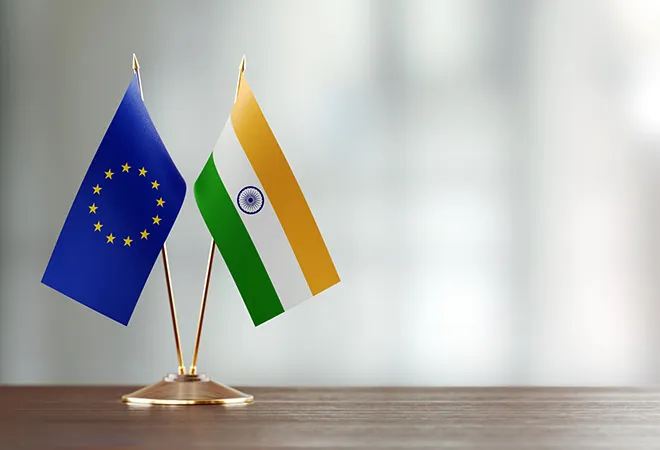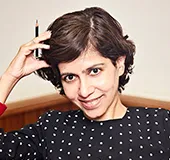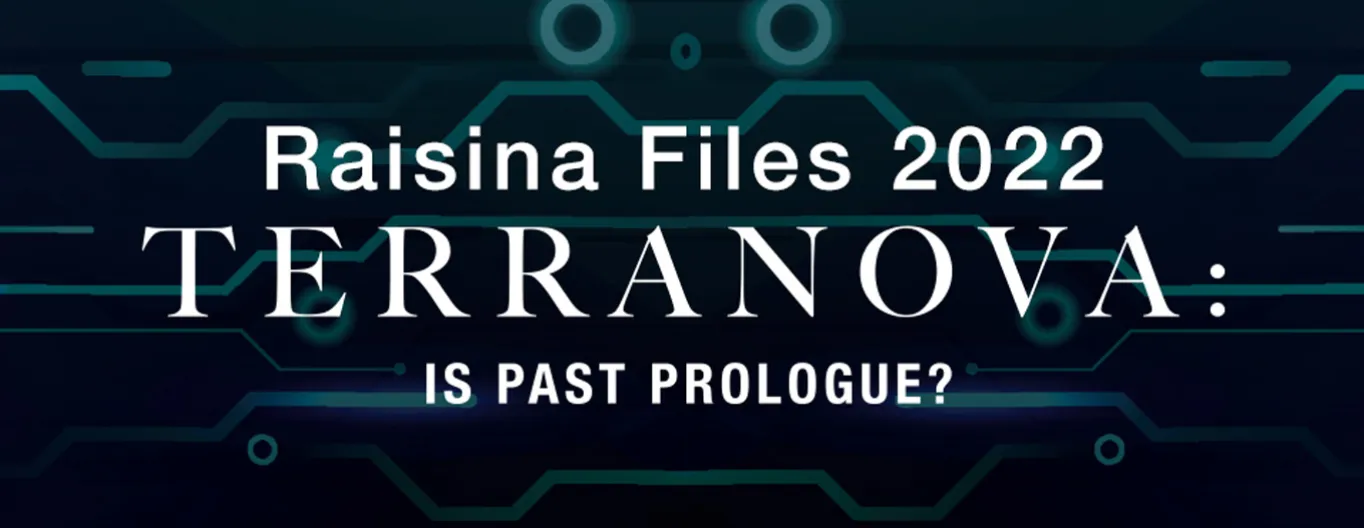 This article is part of the series — Raisina Files 2022.
This article is part of the series — Raisina Files 2022.
The EU and India are “natural allies”
<1>. They have been strategic partners since 2004 and both are committed democracies. The EU-India Leaders’ Summit, held in Porto in May 2021, affirmed not only shared interests but also shared “principles and values of democracy, freedom, rule of law and respect for human rights”
<2> as underpinning the partnership. Besides these long-standing commonalities, diplomatic niceties, and the sweet talk of global summitry though, urgent and new imperatives are also on the rise that demand the joint attention of these two major actors. One key threat is the growing assertiveness of powerful, authoritarian states.
Authoritarian Advance: Knocking on the Borders of EU and India
China’s global expansion via the Belt and Road Initiative (BRI), its military adventurism in Asia, misuse of the multilateral trading system (e.g., via subsidies and forced technology transfers), and gross human rights’ violations in Xinjiang were well-known in Europe for some time. But all these disturbing trends were perhaps still seen as distant enough; developing a narrative in 2019 that China was Europe’s “partner, competitor and rival”
<3>, Europe tried to eat its cake and have it too. Today, the EU has much greater cause for concern. Russia’s invasion of Ukraine has brought the threat directly to European borders. And despite much speculation on how China will play its cards (thereby potentially undermining the efficacy of EU sanctions against Russia – or not
<4>), European politicians and technocrats will be well-served to remember that China and Russia announced a “no-limits” partnership in February, earlier this year. China is no longer a distant threat to Europe, be this via its large investment projects in the transport and technology sectors in Germany,
<5> or via its partnership with Russia.
India too finds itself in a tough spot. For years now, it has experienced China’s increasing overreach across several issue-areas, including military confrontations on its border (with casualties). Its concerns about China are serious enough to make India the sole holdout on the Regional Comprehensive Economic Partnership, and also refrain from joining BRI.
Faced with the advance of authoritarian powers—both globally and on their borders—the “world’s largest democracies”
<6> should be collaborating more closely than ever. But across several crucial areas, it is not the closeness of the EU-India partnership that stands out, but its limitations.
The Limitations of the EU-India Partnership
Witness negotiations over trade, climate change, or indeed geopolitics, and we see that the EU and India often end up on opposing sides.
Negotiations for an EU-India Free Trade Agreement were begun in 2007, but were put on hold in 2013. It took another 7 years for them to resume in 2021.
<7> For all the goodwill on both sides and attempts to drum up public excitement over this step, these negotiations will still not be a cakewalk. In the meantime, trade figures remain underwhelming. India may be the EU’s tenth largest partner and accounts for 1.8 percent of the EU’s trade in goods, falling well behind China that constitutes 16.1 percent.
<8>
The limits of this partnership, moreover, are not restricted purely to the realm of commercial interests. Labour and environmental standards, for instance, have been quite the bugbear in the EU’s trade dealings, not only with India but also with some other major players in the Global South (for instance, the difficulties that the EU-MERCOSUR agreement has run into).
<9> At the COP26 in Glasgow in November 2021, India and China together attracted much criticism for their insistence that the language on coal be changed from “phase out” to “phase down”.
<10>
Fundamental disagreements between the EU and India also appear on questions of geostrategy and high politics, as exemplified over the positions that the two have adopted over Russia and Ukraine. The EU urged India to take a firm line condemning the Russian invasion;
<11> India, however, abstained in both the United Nations Security Council and the UN General Assembly (UNGA).
<12> In doing so at the UNGA, India again ended up in an odd corner of abstaining parties, together with China and Pakistan. Some commentators have interpreted this vote as indicative of the West “mistaking its own unity for consensus”,
<13> but this is too simplistic an analysis: The 141 member countries, which voted in favour, included large and small countries from the Global South.
<14> Different motivations guided the individual members of this minority group; for the purposes of this article, democratic India’s abstentions over the Russia-Ukraine war provide yet another worrying illustration of the divergence between India and the EU.
Explaining the Clumsy Tango
For the unfulfilled potential of their partnership, both the EU and India share equal responsibility.
In terms of miscalculations by the EU, three points are important.
<15> First, the EU tends to place considerable emphasis on business relations with India. This is an issue that India too is interested in promoting, especially under the business-oriented Modi government that has prioritised growth and development. But the EU then swiftly goes down a cul-de-sac of the narrowly defined values of social and environmental standards, whenever trade agreements are discussed. The tone of such discussions, moreover, can come across as if the Europeans are preaching to their Indian counterparts on the importance of liberal values.
<16> Neither the content nor the tone of these discussions are useful for winning trust, especially when negotiating with an ancient civilisation like India.
<17> Second, if one compares this with the EU’s negotiation strategy with China, it is difficult to avoid accusations of hypocrisy. China’s flagrant human rights violations in Xinjiang have produced little more than some tut-tutting in Europe thus far, while business continues as usual. These double standards are also evident in media reporting and punditry in much of Europe: Indian democracy is frequently scrutinised and lambasted, while a blind eye is turned to China’s domestic, regional, and global excesses. Third, even as Europe is slowly waking up to the dangers posed by China to the existing global order, the call for more China-specific research expertise is growing. Unfortunately, however, this is not matched by a demand for more in-depth knowledge on India or other actors in Asia.
<18> To some extent, this is understandable: We tend to focus on the problems and take the rest for granted. But this skewed focus means that there is far too little expertise on India in Europe, and public interest too does not go much beyond the usual clichés. Opportunities to develop EU-India relations into a meaningful and impactful partnership remain untapped, amidst this rather “special” mix of judgementalism and lack of real interest.
The Indian side has also been miscalculating. Three considerations are especially important. First, rather than push back against being put into a corner of “Asian values” and assert its own variants of universal liberalism,
<19> India’s tendency has been to use the language of “pragmatism” in foreign policy. In an agenda-setting speech of 2019, Foreign Minister Jaishankar speaks of “multi-alignment”, “India First”, and “hedging” as part of a “strong and pragmatic policy outlook”. There are some elegant turns of phrase in this speech, e.g.: “Hedging is a delicate exercise, whether it is the non-alignment and strategic autonomy of earlier periods, or multiple engagements of the future…. The answer is in a willingness to look beyond dogma and enter the real world of convergences. Think of it, not just as arithmetic but calculus.”
<20> The problem with this prioritisation of pragmatism—over values—is that it diminishes the potential use of the immense soft power that India could harness to shape its relations with the EU. Second—as is also evident from the emphasis on pragmatic multi-alignment—India shows a continued reluctance to join alliances. The Foreign Minister described this as “I think we should choose a side, and that’s our side.”
<21> At face-value, this Ent-like
<22> philosophy sounds appealing. In fact, however, India might not be well-served by it in the medium term, especially if China’s authoritarian advance continues in the region. To choose one’s own side sometimes requires working closely in alliances and coalitions.
<23> Third, as a result of the first two issues, India often ends up in China’s corner. These moves may be tactical and issue-specific—for instance, during the debates on Special and Differential Treatment at the World Trade Organization—but they lead to a further “hyphenation”
<24> of India with its frequent adversary, China. India’s credibility—as a democratic power and reliable partner for the EU—is not helped by this.
<25>
What Should be Done
What might be done to really get the EU and India on the same page, and then start scripting a future together? Three steps will be vital to any such endeavour.
First, both the EU and India would do well to engage more openly and readily on the question of values. For the EU, this would require several changes in narrative and policy, including a widening of its focus to go beyond narrow questions of labour and environmental standards and include broader questions of democracy and liberalism. The EU would also need to recognise that the “West” is not the sole guardian of liberal values; it is possible, indeed likely, that there are some powerful, homegrown, and even ancient traditions of liberalism in the Global South. India, in turn, would need to become more explicit in “owning” its liberal traditions, and building these systematically into its foreign policy narratives as well as alliance politics.
Second, while recognising the significance of values is important, a mutual use of soft power alone will not suffice in bolstering the EU-India relationship. India’s dependence on Russia for military supplies contributed to its refusal to side with Ukraine; European dependence on Russia for energy led to foot-dragging on sanctions (and continues to produce some perverse and counter-productive policies).
<26> Both the EU and India need to urgently realign their supply chains in strategically important sectors, if they do not want to be held hostage by rival powers in the future. This also creates a vista of new opportunities for them—and other like-minded states—to work together.
Third, more effort and investment need to go into promoting a better understanding of India in Europe, and vice versa. To facilitate this, increased funding in research and education will be indispensable. Collaborations in the Natural and Applied Sciences will be very important for producing compatible, cutting-edge developments in areas such as dual-use technology. But at the same time, the importance of research initiatives in the Social Sciences and Humanities should not be underestimated, especially to further a better appreciation of each other’s societies, politics, and cultures. China’s Confucius institutes have played an important role in Chinese diplomacy; Russian funding still occupies a prominent place in some of the most revered institutions of learning in the West (for instance via the Blavatnik School of Government at the University of Oxford). It is high time that the world’s largest democracies—the EU and India—also started investing more systematically and visibly in each other’s think-tanks, research institutes, and universities.
<1> While this term has entered modern parlance in politics, it is worth mentioning that we find references to this concept in the ancient text of Indian fables, the
Panchatantra.
<2> EU-India Leaders’ Meeting,
Investing in EU-India Strategic Partnership, 2021.
<3> European Commission,
EU-China: A Strategic Outlook, Strasbourg, European Union, 2019.
<4> European Council, European Union.
<5> Xinming Xia and Wan-Hsin Liu, “
China’s Investments in Germany and the Impact of the COVID-19 Pandemic,”
Intereconomics 56, no. 2 (2021), pp. 113–119.
<6> “Investing in EU-India Strategic Partnership, 2021”
<7> European Commission,
Overview of FTA and other Trade Negotiations, European Union, 2022.
<8> “
Countries and regions- India,” European Commission.
<9> “
Stop the EU-Mercosur trade deal and make all trade agreements work for sustainable development,” European Greens.
<10> Malo Cursino and Doug Falkner, “
COP26: China and India must explain themselves, says Sharma,”
BBC, November 14, 2021.
<11> Dipanjan Roy Chaudhury, “
EU Demarche to India, urges firm position on Ukraine issue,”
The Economic Times, February 27, 2022.
<12> United Nations Security Council, United Nations;
United Nations General Assembly.
<13> Edward Luce, “
The west is rash to assume the world is on its side over Ukraine,” Financial Times, March 24, 2022.
<14> General Assembly, United Nations.
<15> It is worth noting that there also some interesting differences among EU member states in their bilateral dealings with India and its region, exemplified by the strategy papers of France versus Germany on the Indo-Pacific (
France’s Indo-Pacific Strategy, 2018; The Federal Government,
Policy Guidelines for the Indo-Pacific, Government of Germany, 2020). The French approach shows greater willingness to recognise security threats, call them out, and engage with India on defence issues; Germany, in contrast, has taken a softer and wide-ranging approach, steering clear of military cooperation thus far. It remains to be seen whether the
Zeitenwende currently underway will translate into a more hard power outreach towards India; on this, Amrita Narlikar and Samir Saran, “
Walking the walk of values-based diplomacy,”
Observer Research Foundation, February 28, 2022.
<16> An example of this patronising approach can be found in the speech of the then-Federal President of Germany, Joachim Gauck’s speech, made during his state visit to India in February 2014: Joachim Gauck (speech, New Delhi, February 6, 2014).
In contrast, President Frank-Walter Steinmeier’s speech, delivered during his state visit to India in March 2018, took more of an eye-to-eye approach: Frank-Walter Steinmeier (speech, New Delhi, March 23, 2018).
<17> Amrita Narlikar and Aruna Narlikar,
Bargaining with a Rising India: Lessons from the Mahabharata, (Oxford: Oxford University Press
, 2014).
<18> Amrita Narlikar, “
Rebooting Germany’s Foreign Policy Towards China,”
Observer Research Foundation, March 25, 2022.
<19> Raimundo Panikkar, “Is the Notion of Human Rights a western concept?”
Diogenes 30, no. 120
(1982), pp. 75- 102, https://journals.sagepub.com/doi/10.1177/039219218203012005; Amartya Sen,
The Argumentative Indian (UK: Penguin 2006); Amrita Narlikar, “
Multilateralism, liberal values, and the Global South,” in
Essays on a 21st Century Multilateralism that Works for All, ed. Brahima S. Coulibaly and Kemal Dervis, (Washington DC: Brookings 2022).
<20> S. Jaishankar, speech, New Delhi, November 14, 2019.
<21> ORF, “
I think we should choose a side, and that’s our side | S Jaishankar, Raisina Dialogue 2019,” YouTube video, 11:34 min, March 19, 2022.
<22> Ents are the shepherds of the forests in Middle-earth – the fantasy world constructed by J.R.R. Tolkein – and exhibit similar caution on taking sides.
<23> Given the EU’s own emphasis on “strategic autonomy” in recent years – a reaction, in good measure, to the difficult Transatlantic relationship during the Trump Presidency – the EU and India could now be especially well-suited to lead geopolitical and geoeconomic coalitions together.
<24> I am thankful to Samir Saran for a stimulating exchange on this in 2019.
<25> Especially when posited against India’s non-alignment/ multi-alignment strategy, it is ironic to note that the EU’s foreign policy chief, Josep Borrell, while stating that neither the EU nor the US could mediate the Russia-Ukraine conflict, declaimed China to be well-suited for this role, “
Russia’s war on Ukraine: ‘It has to be China’ as mediator, EU foreign policy chief says,”
South China Morning Post, March 5, 2022.
<26> Narlikar, “Rebooting Germany’s Foreign Policy towards China”
The views expressed above belong to the author(s). ORF research and analyses now available on Telegram! Click here to access our curated content — blogs, longforms and interviews.



 This article is part of the series —
This article is part of the series —  PREV
PREV



